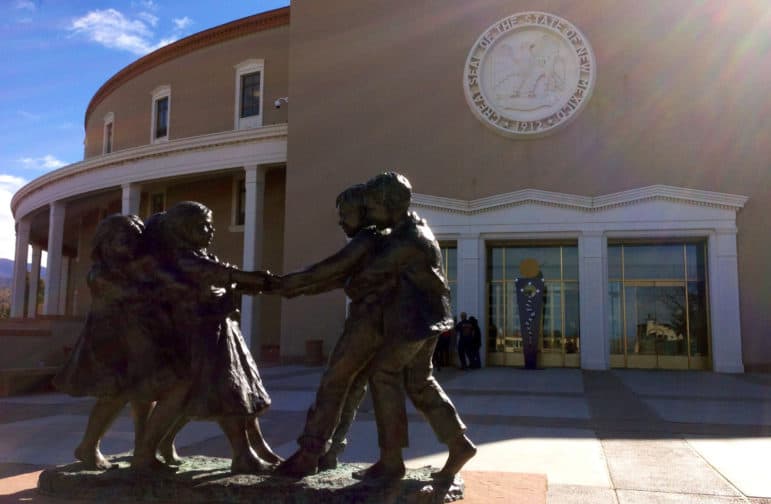
Heath Haussamen / NMPolitics.net
A statue outside the Roundhouse in Santa Fe.
The final pieces of a 2018 fiscal year budget were falling into place Thursday with just enough money to balance spending and send lawmakers home without the need for a special session.
Those measures were advancing even as other bills — such as an effort to increase the tobacco tax or raise money by closing tax loopholes — died in committees and looked to jeopardize any final agreement.
One of the developments came as hospital executives met with Gov. Susana Martinez to discuss a section of House Bill 202, which increases taxes and fees in several areas. One of its provisions would equalize the gross receipts tax on all nonprofit and for-profit hospitals, with the money earmarked for Medicaid.
The New Mexico Hospital Association helped craft a compromise with lawmakers to support the tax if some of the $80 million raised could be used to bridge a shortfall in Medicaid, which costs the state $916 million a year. One hospital executive heading into the meeting said they were going to tell the governor to support the tax.
Also Thursday, the New Mexico House of Representatives was set to vote on final passage of the $6.1 billion spending plan, sending it on to Gov. Martinez. The concurrence vote was expected late Thursday night or Friday.
But the budget is not balanced without $130 million in new money, and one way lawmakers want to solve that is with HB 202. Unless the governor agrees to some of the tax and fee increases, she would have to veto the budget and force lawmakers to return for a special session before July 1, the start of the next fiscal year.
In addition to the hospital tax provision, the bill includes extending the sales tax to all internet purchases, a 10-cent boost in the gasoline tax and an increase in the excise tax on vehicle purchases. The bill also brings in more money by increasing fees for heavy-truck permits and postponing corporate tax cuts.
Democrats in the House and Senate say the state needs more stable revenue streams. Cash reserve levels for the general fund have tumbled to under $77 million, just 1.3 percent, down from over $700 million at the end of 2015. The depletion of reserves is part of the reason Moody’s Investors Services has lowered New Mexico’s bond rating and placed it on a credit watch.
In total, the revenue package would raise more than $300 million, boosting reserves to 3 percent by the end of fiscal year 2018 and 5.7 percent at the end of 2019.
But lawmakers who have spoken with the governor expect her to veto some sections of HB 202, especially the gasoline tax, which would boost the general fund by $50 million.
To replace those pots of money, Sen. Carlos Cisneros, D-Questa, was moving a bill through the Senate Finance Committee late Thursday to free up as much as $63 million in capital outlay projects. That money would then revert to the general fund, and the projects would move forward with bond proceeds.
Democrats initially balked at taking more money from capital projects, but agreed to do so this week in an effort to compromise with Gov. Martinez and House Republicans, who identified that as an alternative to raising taxes.
Cisneros said the money is a one-time fix and won’t help with ongoing budget issues going forward, but it’s a proposal the governor indicated she would accept. “Nobody is going to be happy coming back in a week or two to do what we’ve already done,” he said.
Rep. Carl Trujillo, D-Santa Fe, the sponsor of HB 202, said the capital outlay bill would provide just enough new money to balance the budget but does not do anything to restore cash levels. ‘That’s still problematic,” he said.
Gov. Martinez pledged to increase reserves to 5 percent, but nothing that she has proposed would accomplish that.
Rep. Patricia Lundstrom, D-Gallup, said her first priority coming into the session was to preserve education funds and restore reserve levels so the state would not see another credit downgrade.
Now, she said, everyone just wants to go home.
“There’s not a lot of places to get money. We did the best we could,” she said. “I’ve got my fingers crossed.”
The budget appropriates just $22.6 million above current spending, or 0.4 percent. The allocation to public K-12 education is $2.69 billion, an increase of $13.3 million, plus a special appropriation of $10.6 million to restore some cuts to the State Equalization Guarantee, a funding formula based on student enrollment.
The next largest category of spending is Medicaid, which received an appropriation of $916 million, the same as 2017.
One of the losers in the budget is higher education, which will see a cut of $7.6 million, or a 1 percent reduction for most universities and community colleges.
Contact Bruce Krasnow at brucek@sfnewmexican.com.